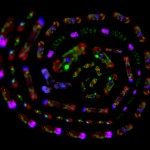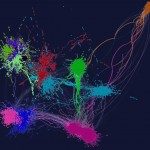Lien vers Pubmed [PMID] – 15725626
DNA Repair (Amst.) 2005 Apr;4(4):459-68
The yeast RAD27 gene encodes a functional homolog of the mammalian FEN1 protein, a structure-specific endo/exonuclease which plays an important role in DNA replication and repair. Previous genetic interaction studies, including a synthetic genetic array (SGA) analysis, showed that the survival of rad27Delta cells requires several DNA metabolic processes, in particular those mediated by all members of the Rad52-dependent recombinational repair pathway. Here, we report the results of our SGA analysis of the collection of non-essential yeast genes against the rad27Delta mutation, which resulted in the identification of a novel synthetic lethal interaction conferred by mutations affecting the Nup84 nuclear pore subcomplex (nup133Delta, nup120Delta and nup84Delta). Additional screens showed that all Rad52 group genes are required for the survival of the nup133Delta and nup120Delta mutants, which are defective in nuclear pore distribution and mRNA export, but not of the nup133DeltaN mutant, which is solely defective in pore distribution. This requirement for the DNA double-strand break (DSB) repair pathway is consistent with the observation that, like rad27Delta, the nup133Delta, nup120Delta and nup84Delta mutants are sensitive to methyl methanesulfonate (MMS). Furthermore, nup133Delta cells exhibit an increased number of spontaneous DNA repair foci containing Rad52. Altogether, these data suggest that the pathological interactions between the rad27Delta and specific nupDelta mutations result from the accumulation of unrepaired DNA damages.



